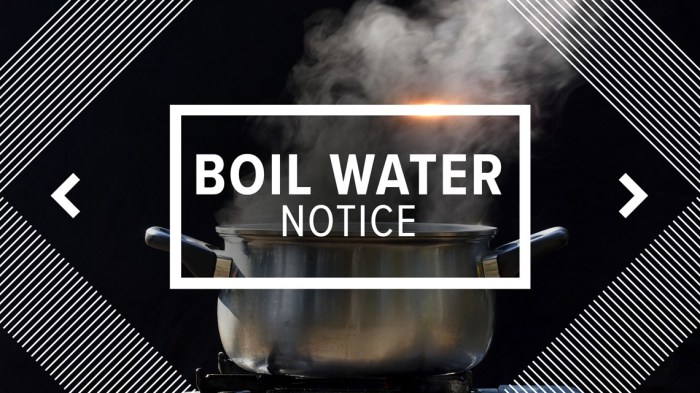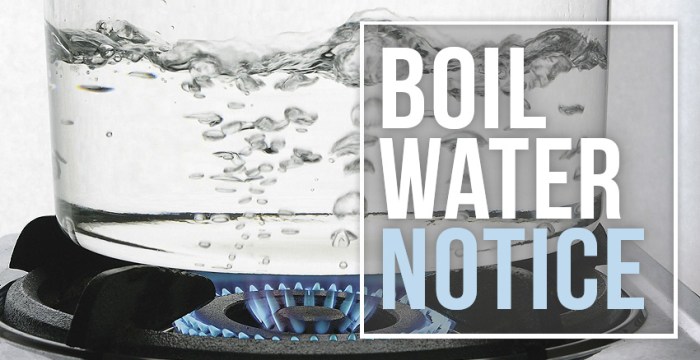Suppose a boil water notice – Imagine receiving a boil water notice, a directive that can disrupt your daily routine and raise concerns about the safety of your tap water. In this comprehensive guide, we’ll explore the ins and outs of boil water notices, their causes, health risks, recommended actions, and potential impacts.
Understanding the significance of boil water notices is crucial for protecting your health and the well-being of your community. Join us as we delve into the essential aspects of this topic, empowering you with the knowledge to navigate boil water situations with confidence.
Definition and Causes

A boil water notice is a directive issued by public health authorities when the water supply is contaminated or suspected to be contaminated with harmful bacteria or other microorganisms. It instructs residents to boil their tap water before consuming it to kill any potential pathogens and prevent illness.
Common causes of boil water notices include:
Water Contamination, Suppose a boil water notice
- Fecal contamination from sewage leaks or overflows
- Chemical spills or industrial accidents
- Agricultural runoff containing bacteria or pesticides
Infrastructure Issues
- Water main breaks or repairs
- Power outages affecting water treatment plants
- Insufficient chlorination or disinfection
Health Risks and Symptoms

Consuming contaminated water poses significant health risks. The presence of harmful microorganisms, such as bacteria, viruses, and parasites, can lead to a range of waterborne illnesses.
Suppose a boil water notice is issued in your area, it’s crucial to stay informed. One helpful resource is the punto y aparte 6th edition , which provides comprehensive guidance on water safety and health. By following the guidelines outlined in this publication, you can ensure the safety of your drinking water and minimize the risk of waterborne illnesses during a boil water notice.
Gastrointestinal Distress
One of the most common symptoms of waterborne illnesses is gastrointestinal distress, which can manifest as diarrhea, vomiting, nausea, and abdominal pain. These symptoms are caused by the irritation and inflammation of the digestive tract, leading to electrolyte imbalances and dehydration.
Fever
Fever is another common symptom of waterborne illnesses. It occurs when the body’s immune system fights against the invading microorganisms. A high fever can be a sign of a serious infection and requires prompt medical attention.Other symptoms of waterborne illnesses can include fatigue, muscle aches, headaches, and skin rashes.
The severity of symptoms varies depending on the type of microorganism involved, the amount of contaminated water consumed, and the individual’s immune system.
Recommended Actions

When a boil water notice is issued, it’s crucial to take immediate steps to protect your health. Boiling water before use is paramount, as it effectively kills harmful bacteria and microorganisms that may be present in the water supply.
Importance of Following Recommendations
Adhering to the recommended actions during a boil water notice is essential to prevent waterborne illnesses. These illnesses can range from mild stomach upsets to severe, life-threatening infections. By following the recommendations, you minimize your risk of exposure to contaminated water and safeguard your health.
Specific Actions to Take
*
- *Boil water before using it for drinking, cooking, or brushing your teeth. Bring water to a rolling boil for at least one minute before using it for these purposes.
- *Avoid consuming unboiled water. This includes drinking from the tap, using ice made from tap water, or eating uncooked foods that may have been washed in tap water.
- *Use bottled water for drinking and cooking. If possible, purchase bottled water for drinking and cooking during a boil water notice.
- *Wash fruits and vegetables thoroughly with boiled water. If you cannot use bottled water, wash fruits and vegetables thoroughly with boiled water before eating them.
- *Clean and disinfect surfaces that may have come into contact with unboiled water. This includes countertops, sinks, and dishes.
Duration and Communication

The duration of a boil water notice depends on several factors, including the severity of the contamination, the size of the affected area, and the effectiveness of the measures taken to address the issue. Typically, boil water notices remain in effect until the water supply is tested and confirmed to be safe for consumption.
To ensure the public is informed about boil water notices, various methods are employed, such as public announcements, media alerts, and direct communication with affected residents. Local authorities, water utilities, and public health agencies collaborate to disseminate information through multiple channels, including television, radio, newspapers, websites, and social media.
Public Announcements
- Mayors or other local officials may issue public announcements via press conferences or recorded messages.
- These announcements provide details about the boil water notice, including the affected areas, the reasons for the notice, and the recommended actions.
Media Alerts
- Local news outlets play a crucial role in disseminating information about boil water notices.
- Television, radio, and online news platforms broadcast alerts and provide updates on the situation.
- Media outlets often interview experts and officials to provide additional context and guidance to the public.
Direct Communication
- Affected residents may receive direct communication from water utilities or public health agencies.
- This communication can be in the form of letters, emails, or phone calls.
- Direct communication provides specific instructions on how to comply with the boil water notice and ensures that all residents are aware of the situation.
Exceptions and Special Considerations

Boiling water may not be feasible for everyone, especially those with limited access to cooking facilities.
Alternative Methods for Obtaining Safe Drinking Water
In such situations, alternative methods can be used to obtain safe drinking water:
- Bottled Water:Bottled water is a convenient and widely available option. Look for bottles labeled “purified” or “spring water” to ensure safety.
- Water Purification Systems:Water purification systems, such as filters or distillers, can remove contaminants from tap water, making it safe to drink.
Impact and Consequences

A boil water notice can have significant impacts on individuals and communities, disrupting daily routines and potentially leading to economic and social consequences.
The inability to use tap water for drinking, cooking, or cleaning can cause inconvenience and stress, especially for those with young children or those who rely on public water sources.
Economic Consequences
- Businesses that rely on water for their operations, such as restaurants and food processing facilities, may have to close or reduce their operations, leading to lost revenue and potential layoffs.
- Individuals may incur additional expenses for bottled water, water filtration systems, or water delivery services.
Social Consequences
- Schools and daycare centers may have to close or implement alternative water sources, disrupting children’s education and childcare arrangements.
- Community events and gatherings may be canceled or postponed, affecting social cohesion and well-being.
Key Questions Answered: Suppose A Boil Water Notice
What should I do if I’m under a boil water notice?
Bring water to a rolling boil for at least one minute before using it for drinking, cooking, or brushing your teeth.
How long do boil water notices typically last?
The duration varies depending on the severity of the contamination and the time needed for testing and repairs.
What are the potential health risks of consuming contaminated water?
Waterborne illnesses can cause symptoms such as gastrointestinal distress, fever, and dehydration.